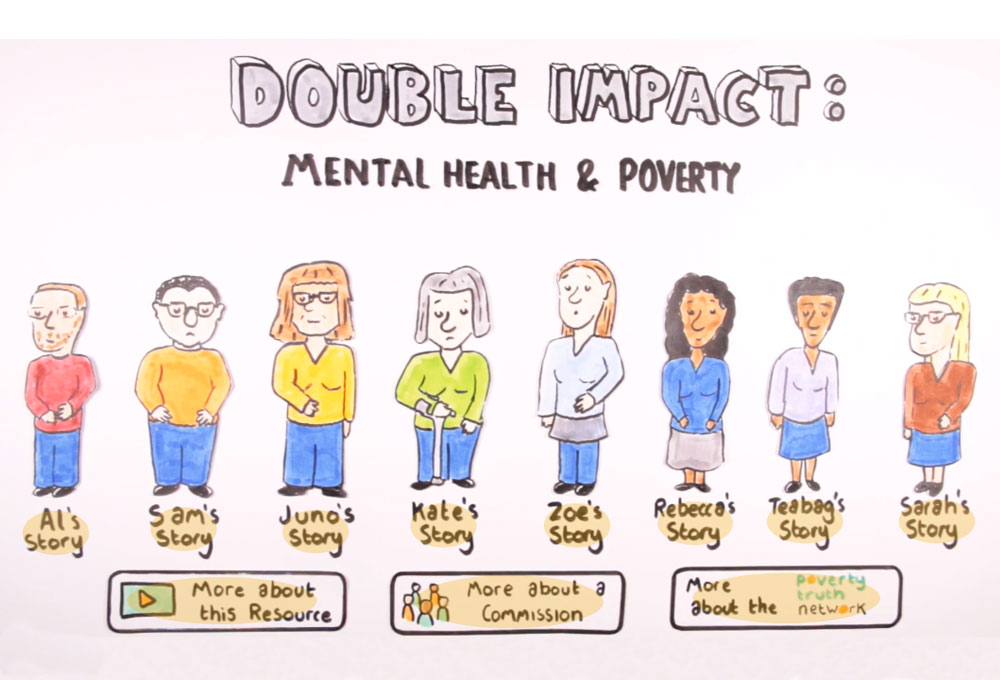In this blog, Karen from Swansea PTC introduces the Double Impact Resource which is now available here.
“Only stories can change hearts and only hearts can change minds” Sheila McGillvay.
Like all things to do with Poverty Truth, the magic happens through the process of sharing our stories, building collectively and the power of human creativity.
My involvement as a community commissioner in Wales’s first Poverty Truth Commission in Swansea has led to the understanding that to work together effectively a few ingredients are necessary:
One would be trust, this is built on the idea that we each bring different perspectives, but all perspectives are valued.
Two would be listening, in an age of hyper productivity we are often conditioned to get on with the ‘doing’, when things are slowed down to enable meaningful listening, the richness in ‘being’ begins to surface.
And the third would be hope, there needs to be a willingness for change to happen.
Being part of the commission made me curious to explore how the processes at a local level could be utilised nationally. Part of the work of the Poverty Truth Network is to take the consistently recurring themes from local conversations, and shine a light and amplify them through our collective voice. Our first couple of Zoom conversations didn’t really have a definitive starting point. Instead a handful of eager participants from all corners of the Poverty Truth Network joined together with a will and hope to make change around mental health and poverty.
One of the insights that came from the conversations with the civic and business commissioners in Swansea was the impact poverty has on the individual’s capacity to realise their potential. For many of us with lived experience within the group we could speak to this experience of the double impact, whereby a cycle occurred between the lack of resource within the struggle with poverty and subsequent effects of poor mental health. The cycle often became a loop in which the professionals within the structures of organisations often missed the underlying impact of poverty when providing a supporting role for mental health – and so the double impact project came alive!
We wanted to create something that could provide a tangible impact and knew from our individual experience within our local commissions the changes that occurred in people when stories were told. We reached out to key people within our networks to test our ideas and ask for feedback to ensure the resource would be meaningful. Our initial scope was to build a training resource for students entering fields that would support people’s mental health, we reached out to universities delivering training to both mental health professionals and social work students. Our biggest challenge was to capture the stories of lived experience in a respectful and valued way. This wasn’t a challenge because we knew where to find the stories, the contributions were readily offered from a place of hope for change. But because the stories were emotional and deeply personal, it was important in holding and valuing these parts of people’s lives that they were told in a way that honoured the courage and bravery involved in the giving. Like all processes in Poverty Truth, it feels like we’ve taken a long old journey as a group, but one that reflects a tapestry of people working together from a mixture of resources weaving those important ingredients of trust and listening to create a beacon of hope!
For my own reflections of being part of building the double-impact resource, I am feeling incredibly positive that the resource we have created will provide a meaningful channel in which to connect to future practitioners in the mental health field. Feedback we’ve received so far reflects the power held within the stories and there is an eagerness to take the resource beyond its intended remit for this very reason.
On a personal level I see each shift in the narrative as a step in a more human and compassionate direction. As a mum with experience of the struggle with poverty I see something more vital underneath. When I think about the important things we celebrate as a family such as my daughter’s graduation or taking a family holiday, I realise that it is the ordinary things – the things all children and young people across our community should be able to enjoy and take part in. From being part of a poverty truth commission and from a place of lived experience I’m all too aware that these are not always opportunities all families get to enjoy. And even when these achievements can be made, for people with poor mental health, struggling against poverty there are often mountains to climb or judgements to manoeuvre to access even the basic provisions within our society.
My hope for the double-impact resource is in changing hearts and minds, so that we can create a society together which enables everyone to thrive.
